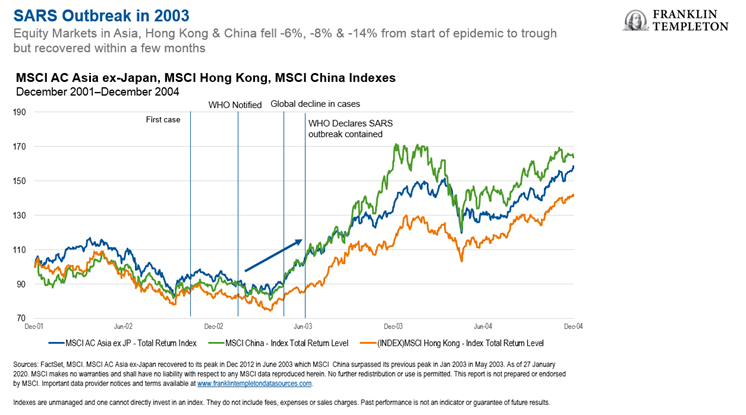As the deadly Coronavirus spreads globally, ETFs with exposure to emerging markets, most notably China, are seeing their performances suffer.
The first couple of weeks of 2020 looked promising for China as its trade war with the US seemed to calm following the first phase of a deal was implemented. However, on 13 January, four days before the agreement, the first death was announced in the city of Wuhan as a result of the Coronavirus.
Since then, over 360 people in China have died following the virus which has spread globally, infecting 17,000 people including those from the US, Australia, France and the UK. On 30 January, the World Health Organisation (WHO) declared the outbreak a global public health emergency.
The virus was believed to have been sourced from a wildlife market in Wuhan.
After closing on 23 January for the Lunar New Year break, China’s onshore markets re-opened on Monday 3 February following a delay.
Since the news was announced that the coronavirus had its first fatality, the Xtrackers FTSE China 50 UCITS ETF (XX25) saw its net asset value (NAV) fall 13.1% from 13 to 31 January.
Over the same period, the iShares Core MSCI EM IMI UCITS ETF (EMIM) saw its NAV fall 9.7%. Other equity MSCI indices in Asia, Hong Kong and China have fallen 4%, 5% and 6%, respectively.

While the market has seen a significant downturn over a short period, some investors don’t see this as long-term and are hesitant to restructure.
Andrew Limberis, investment manager at OMBA Advisory and Investments, told ETF Stream: “Firstly, this is very much a human crisis which is something that we must remember and we do not yet know how bad it will get.
“Secondly, our strategic positioning on China (and EM Asia) for that matter has not changed. We invest for the medium to long term and we currently do not see this outbreak as impacting our strategic positioning.”
The Coronavirus has been heavily compared with the SARS outbreak in 2003 which had originated in Hong Kong.
"SARS had a disproportionate impact on Asia as compared with the rest of the world," Limberis continued. "And while the outbreak continues to spread globally, so far we see South-East Asia as being most impacted."
“While we think it is far too early to make a call on the extent and impact of this outbreak, we do look at the SARS outbreak in 2003 as a potential scenario.”

The next two months will be very important as prices are expected to bounce back one the outbreak is fully contained, however, it is first believed things are going to get worse before they get better.
Chetan Sehgal, director of portfolio management at Franklin Templeton emerging markets equity, commented: “We are closely monitoring the impact on emerging market economies and equity markets from the outbreak of the Coronavirus in China and other parts of the world.
“The situation is at an early stage and is evolving quickly. Both market and macro implications depend on the severity and duration of this epidemic episode.”
Franklin Templeton sees the short term impact of the disaster to be negative but will bounce back to neutral in the mid-long term. Sectors such as travel, leisure, retail and select sub-segments of discretionary consumption will likely be directly impacted in the near term, according to the company.
China is a large contributor to global tourism which is expected to reduce significantly and impact many markets. Additionally, factory closures in the country could disrupt the supply chain for which China plays a large role.
Looking specifically at factors, a report from Style Analytics, named Coronafactors, said investors should be worrying more if the contagion results in a fear-scenario similar to the 9/11 attacks or the Chinese equity crisis. If this were to be the case, Style Analytics suggests looking into tilting towards high-momentum and low-volatility stocks.
Factor investing in emerging markets
From historical performances, it suggests that high momentum and low-vol would outperform if the contagion and mortality numbers, which are already high, were to continue rising.
While it is easy to compare this event to similar scenarios in the past, it is also important to remember historical comparisons can be hazardous due to differing economic circumstances.
Australian ETF issuer BetaShares said China is now “a lot more important to the global economy than it was in 2003”. The country’s GDP has grown from 9% to 20% over this period.
David Bassanese, chief economist at BetaShares, continued: “China’s increased economic importance suggests global equity markets may also not as easily shrug off the virus outbreak in the short term as they did in 2003.”





